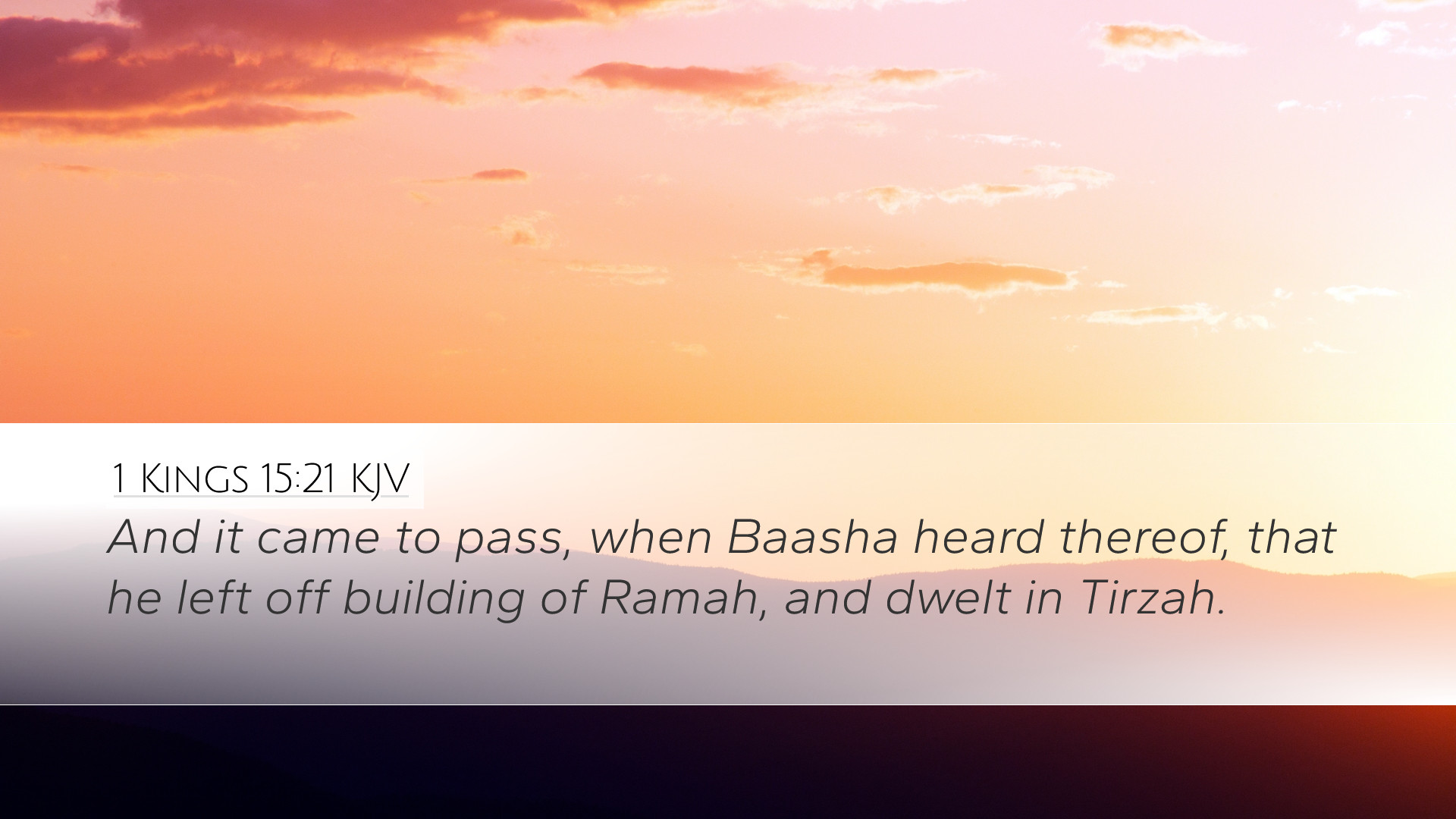Bible Verse: 1 Kings 15:21
“And when Baasha heard it, he stopped building Ramah, and dwelt in Tirzah.”
Overview and Context
The historical context of 1 Kings 15:21 is deeply rooted in the ongoing conflict between the Northern and Southern Kingdoms of Israel. Baasha, king of Israel, had fortified Ramah as a means to control the movement of people between the two kingdoms and to fortify his authority against Asa, king of Judah. Understanding this political backdrop is essential for grasping the implications of Baasha's actions.
Commentary Insights
-
Matthew Henry
Henry notes that Baasha's cessation of work on Ramah signifies a moment of vulnerability for him. It reflects both his response to external pressures, particularly Asa's military actions, and the larger divine orchestration at play. Henry emphasizes that God’s hand is evident as he urges Baasha to abandon his plans, highlighting the futility of opposing God’s will.
-
Albert Barnes
Barnes expands on the significance of Tirzah as the new residence of Baasha. Tirzah had historical significance and beauty, representing a strategic retreat and restructuring of authority. He reflects on the notion that political maneuvers cannot thwart divine intentions and that God uses such circumstances to fulfill His purposes among nations.
-
Adam Clarke
Clarke brings an innovative perspective by suggesting that Baasha's abandonment of Ramah was indicative of his recognition of Asa's power. It underscores not only Baasha's tactical retreat but shows the larger pattern of fear and honor that intertwine among the leaders of Israel and Judah, with God ultimately guiding these leaders as part of His overarching plan.
Theological Implications
This verse carries significant theological weight. It exemplifies divine sovereignty over human affairs, suggesting that while kings may plot and build, the ultimate decision rests in God's hands. The actions of Baasha can be viewed as a foreshadowing of the futility of resisting God’s plan, a lesson that resonates through the ages.
The implication for both contemporary readers and leaders is profound; it is a reminder of the transient nature of power when opposed to divine will. The lesson here is eternal—those in power must recognize the authority of God and the directional moves of His providence.
Historical Applications
This passage invites reflection on how modern leaders respond to challenges. Just as Baasha abandoned Ramah in the face of adversity, contemporary leaders may find wisdom in recognizing when to adapt and redefine strategies. The movement from Ramah back to Tirzah symbolizes a return to what might be a safer, more strategic place of influence and control.
Moreover, the importance of seeking God’s guidance in leadership decisions is a principle that remains relevant. Leaders and theologians must constantly evaluate their actions, seeking alignment with God’s will in a landscape marked by competing interests and desires.
Pastoral Applications
For pastors, this verse provides a teaching moment about the nature of leadership and the significance of humility in the face of God’s direction. It emphasizes the need for congregational leaders to understand that true authority comes from God and that they must be responsive to His movements and commands.
In pastoral care, this scripture encourages praying for wisdom and discernment. Just as Baasha had to respond to Asa's actions, pastoral leaders are called to attentively listen to how God is guiding their communities, adapting their ministry approaches as necessary while seeking the peace and welfare of their congregations.
Conclusion
1 Kings 15:21 serves as a mirror reflecting the divine hand in human affairs, encouraging an understanding of the futility of pride and self-reliance against God's sovereignty. As we study the layers of meaning in this scripture, we recognize a call to faithful obedience, strategic humility, and a reminder of God’s ultimate sovereignty over history and human leadership.


